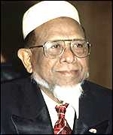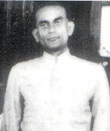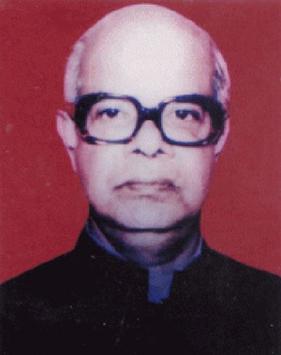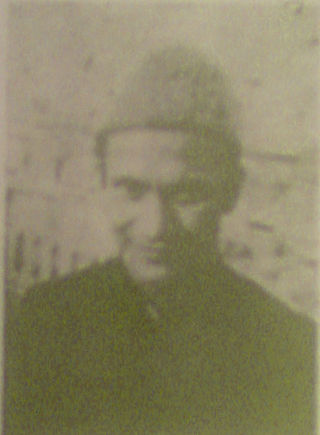Shah Azizur Rahman was a Bangladeshi politician who served as the Prime Minister of Bangladesh. However, he was the subject of considerable controversy for his collaboration with the Pakistan Army against the struggle for Independence of Bangladesh.
Mohammad Abdul Hannan was a politician of Bangladesh.

Abdus Samad Azad was a Bangladeshi diplomat and politician. He was elected to Bangladesh's parliament five times from 1970 to 2001. He was also elected Member of Lower Assembly in the Parliament of the then East Pakistan. He became President of the Muslim Student Federation of All - Asam in 1946 and led the Language Movement in 1952.

Mizanur Rahman Chowdhury was a Bengali politician, most notable for serving as Prime Minister of Bangladesh from 9 July 1986, to 27 March 1988.

Muhammad Mansur Ali was a Bangladeshi politician who was a close confidant of Sheikh Mujibur Rahman, the founding leader of Bangladesh. A senior leader of the Awami League, Mansur also served as the Prime Minister of Bangladesh in 1975.
Khandakar Abdur Rashid, better known as Abdur Rashid Tarkabagish was a Bangladeshi politician and Islamic scholar. His career spans from the anti-colonial independence movement to the establishment of both Pakistan and Bangladesh. Tarkabagish was the second president of the All Pakistan Awami Muslim League, and served as a member of the National Assembly of Pakistan and later the Parliament of Bangladesh. Despite being a member of the treasury bench, he opposed what he considered to be the repressive mentality of the Nurul Amin government towards the Bengali Language Movement.
Mohammad Toaha was a language activist of the 1952 language movement and a prominent left-wing politician from Bangladesh.

Abdul Malek Ukil was the President of Bangladesh Awami League, Speaker of Parliament, Home Minister, Health Minister, a member of Parliament for many years and a lawyer of the Supreme Court of Bangladesh. He was one of the drafters of the Constitution of Bangladesh and also one of the founding members of East Bengal Muslim Students League.

Shamsul Huq (1918–1965) was a Pakistani Bengali politician who led a parliamentary committee in the Constituent Assembly of Pakistan to advocate for the recognition of the Bengali language during the Language movement of the 1950s. He was also the first and third general secretary of the Awami League, which played a key role in Bengali nationalist movement in the 1950s and 1960s.

Ataur Rahman Khan was a Bangladeshi lawyer, politician and writer, and served as Chief Minister of East Pakistan from 1 September 1956 – March 1958, and as the Prime Minister of Bangladesh from 30 March 1984 to 9 July 1986.

Fazlul Quader Chowdhury was a Bengali politician who served as the 5th speaker of the National Assembly of Pakistan from East Pakistan. He belonged to Ayub Khan's Convention Muslim League. He was also the Acting President of Pakistan from time to time when Ayub Khan left the country. His elder brother Fazlul Kabir Chowdhury was the leader of the opposition in East Pakistan assembly. Quader was preceded by Maulvi Tamizuddin Khan of Awami League.

Abdul Hamid Khan Bhashani, often shortened as Maulana Bhashani, was a Bengali politician. His political tenure spanned the British colonial India, Pakistan and Bangladesh periods. Maulana Bhashani was popularly known by the honorary title Mozlum Jananeta for his lifelong stance advocating for the poor. He gained nationwide mass popularity among the peasants and helped to build the East Pakistan Peasant Association. Owing to his political leaning to the left, often dubbed Islamic Socialism, he was also called 'The Red Maulana'. He is considered as one of the main pillars of Bangladeshi independence of 1971.
Gobindaganj Government High School (GGHS) is a secondary school in Rangpur Division, Bangladesh. It stands on the central town area of Gobindaganj, Gobindaganj Upazila, Gaibandha District. It was established in 1912.

Ahmed Hossain, minister for agriculture, forest and fisheries department in Huseyn Shaheed Suhrawardy's cabinet 1946/47, chairman of Rangpur District Board, minister for agriculture in East Pakistan in Abu Hossain Sarkar's cabinet 1955–56. Represented his Shagata and Fulchari constituency, of Gaibandha District as MLA and MP from 1937 to 1958.

The Constituent Assembly of Bangladesh was the constituent assembly of Bangladesh. It was the country's provisional parliament between 1971 and 1973. In 1972, it drafted and adopted the Constitution of Bangladesh. The assembly was dominated by the Awami League, with a minority being independent lawmakers.
Mashiur Rahman (1920–1971) was a Bangladeshi lawyer and politician, a member of the East Bengal Legislative Assembly and cabinet minister in the East Pakistan government of Ataur Rahman Khan. He was instrumental in the founding of the Bangladesh Awami League and in the Bengali Language Movement, and supported Sheikh Mujibur Rahman.
Syed Altaf Hossain was a Bangladeshi politician who was a member of Parliament and Minister of Railway.
Zikrul Haque was a physician and politician who was elected to the National Assembly of Pakistan in 1970. He was killed in the Bangladesh Liberation war and is considered a Martyr in Bangladesh.
Adeluddin Ahmad was a Bangladeshi lawyer and politician.
Golam Moula was a Pakistani-Bengali medical doctor, politician and political organizer. He was elected a member of the East Pakistan Legislative Assembly in the by-elections of 1956 and a member of the National Assembly of Pakistan in 1962. At that time he was the whip of the opposition in the Pakistan National Assembly.









